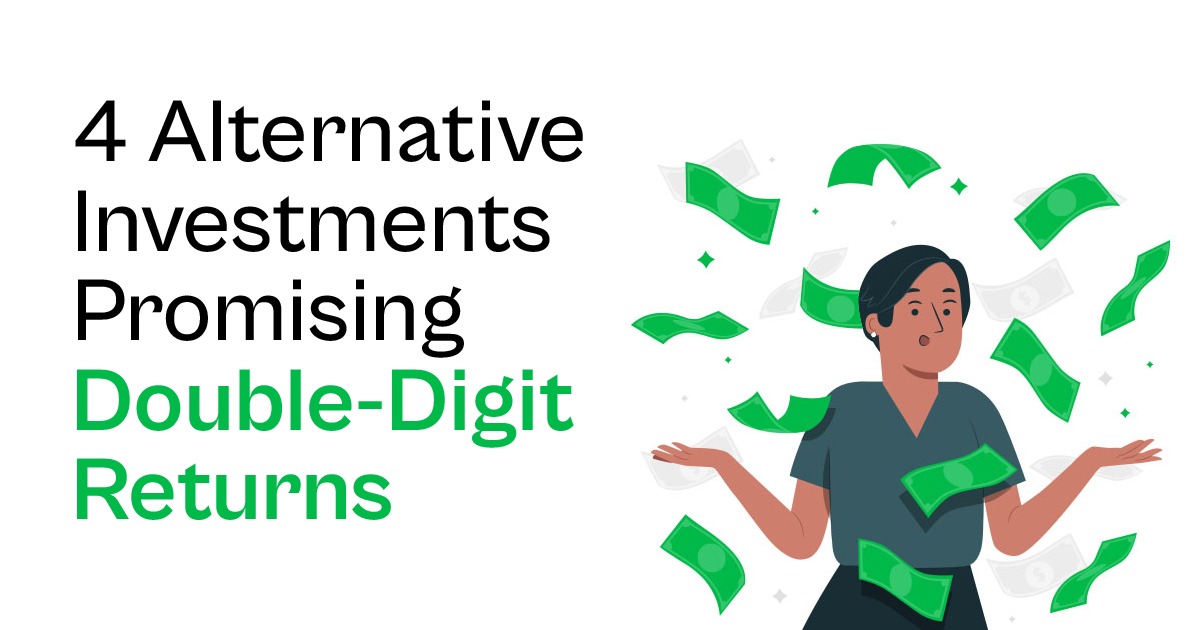Investment options such as term deposits (FDs), stocks, mutual funds and gold are very popular. But recently, many alternative investment options have also aroused the curiosity of investors. The List of alternative investments includes hedge funds, private equity, commodities, real estate, venture capital, private debt placement, peer-to-peer loans, investments in startups, art, antiques, vintage coins, stamps, inventory financing, etc.
Many investors, especially HNI, Family Offices and some wealthy retirees, use these tools to generate passive and recurring income.
 Interestingly, these products promise a yield of 11-13%. These yields are very attractive, especially compared to traditional debt products that offer yields of 5 to 7%. Moreover, most alternative investments are not linked to the stock or bond markets. This helps them diversify investments beyond traditional market-related products.
In this blog, we will explore Four alternative investment options. And examine how these investment opportunities work, the risks they entail and the returns they can generate.
1. P2P loans
The concept of P2P lending is almost similar to the operation of a bank. In a traditional configuration, the bank retains the difference that it receives from the interest paid and earned.
The bank also establishes many rules, conditions and conditions on who can borrow, how much can be borrowed, what interest can be paid, etc. now modern P2P lending platforms have been built by removing the requirements of banks from the picture.
As a result, lenders or investors can earn additional interest on their money. Likewise, borrowers can have access to financing through personalized approval procedures.
Essentially, P2P lending platforms such as Faircent, Lendbox, LiquiLoans and RupeeCircle act more as intermediaries and risk mitigators.
During the process, they offer a range of facilities such as integration, credit assessment, contract signing, loan repayment and collection services.
Interestingly, these products promise a yield of 11-13%. These yields are very attractive, especially compared to traditional debt products that offer yields of 5 to 7%. Moreover, most alternative investments are not linked to the stock or bond markets. This helps them diversify investments beyond traditional market-related products.
In this blog, we will explore Four alternative investment options. And examine how these investment opportunities work, the risks they entail and the returns they can generate.
1. P2P loans
The concept of P2P lending is almost similar to the operation of a bank. In a traditional configuration, the bank retains the difference that it receives from the interest paid and earned.
The bank also establishes many rules, conditions and conditions on who can borrow, how much can be borrowed, what interest can be paid, etc. now modern P2P lending platforms have been built by removing the requirements of banks from the picture.
As a result, lenders or investors can earn additional interest on their money. Likewise, borrowers can have access to financing through personalized approval procedures.
Essentially, P2P lending platforms such as Faircent, Lendbox, LiquiLoans and RupeeCircle act more as intermediaries and risk mitigators.
During the process, they offer a range of facilities such as integration, credit assessment, contract signing, loan repayment and collection services.
 2. Fractional Real Estate
Traditionally, investing in real estate requires a capital of at least a few Lakhs to a few Crores. But now platforms like Strata, PropShare, etc. have allowed retail investors to own commercial properties in smaller stocks.
The business model begins with the Fractional Ownership platform, which identifies an investable Class A property, such as a commercial building or a warehouse. The identified properties mostly have existing tenants bound by a long-term contract, which translates into visibility of cash flows.
Since the price of owning such a property would cost a few billion, the platform invites investors to pool money to finance the acquisition of the asset. The minimum commitment for investors starts at Rs 10 Lakh. However, this may vary for different platforms.
After pooling the funds of several investors, the platform creates a special vehicle (SPV) to acquire the property. And the investor becomes a shareholder of this company.
3. High-yield fixed income investments
2. Fractional Real Estate
Traditionally, investing in real estate requires a capital of at least a few Lakhs to a few Crores. But now platforms like Strata, PropShare, etc. have allowed retail investors to own commercial properties in smaller stocks.
The business model begins with the Fractional Ownership platform, which identifies an investable Class A property, such as a commercial building or a warehouse. The identified properties mostly have existing tenants bound by a long-term contract, which translates into visibility of cash flows.
Since the price of owning such a property would cost a few billion, the platform invites investors to pool money to finance the acquisition of the asset. The minimum commitment for investors starts at Rs 10 Lakh. However, this may vary for different platforms.
After pooling the funds of several investors, the platform creates a special vehicle (SPV) to acquire the property. And the investor becomes a shareholder of this company.
3. High-yield fixed income investments
 Over the past two years, FD yields have struggled to match the rate of inflation. But that is changing now. We are witnessing a boom in start-ups offering retail investors bonds, structured debt securities and other high-yield fixed income instruments.
They are trying to weigh in on the $1.5 trillion FD market with high-yield debt securities. Not only do they offer higher interest rates, but they also allow investors to deposit amounts as low as Rs 10,000.
Platforms such as Wint Wealth, BondsKart, AltiFi, etc., offer government bonds, AAA-rated securities, high-yield corporate bonds rated BBB, private bond investments and structured bonds. Therefore, investors can choose from a variety of products, yields, credit protections and liquidity.
Over the past two years, FD yields have struggled to match the rate of inflation. But that is changing now. We are witnessing a boom in start-ups offering retail investors bonds, structured debt securities and other high-yield fixed income instruments.
They are trying to weigh in on the $1.5 trillion FD market with high-yield debt securities. Not only do they offer higher interest rates, but they also allow investors to deposit amounts as low as Rs 10,000.
Platforms such as Wint Wealth, BondsKart, AltiFi, etc., offer government bonds, AAA-rated securities, high-yield corporate bonds rated BBB, private bond investments and structured bonds. Therefore, investors can choose from a variety of products, yields, credit protections and liquidity.
 Interestingly, these products promise a yield of 11-13%. These yields are very attractive, especially compared to traditional debt products that offer yields of 5 to 7%. Moreover, most alternative investments are not linked to the stock or bond markets. This helps them diversify investments beyond traditional market-related products.
In this blog, we will explore Four alternative investment options. And examine how these investment opportunities work, the risks they entail and the returns they can generate.
1. P2P loans
The concept of P2P lending is almost similar to the operation of a bank. In a traditional configuration, the bank retains the difference that it receives from the interest paid and earned.
The bank also establishes many rules, conditions and conditions on who can borrow, how much can be borrowed, what interest can be paid, etc. now modern P2P lending platforms have been built by removing the requirements of banks from the picture.
As a result, lenders or investors can earn additional interest on their money. Likewise, borrowers can have access to financing through personalized approval procedures.
Essentially, P2P lending platforms such as Faircent, Lendbox, LiquiLoans and RupeeCircle act more as intermediaries and risk mitigators.
During the process, they offer a range of facilities such as integration, credit assessment, contract signing, loan repayment and collection services.
Interestingly, these products promise a yield of 11-13%. These yields are very attractive, especially compared to traditional debt products that offer yields of 5 to 7%. Moreover, most alternative investments are not linked to the stock or bond markets. This helps them diversify investments beyond traditional market-related products.
In this blog, we will explore Four alternative investment options. And examine how these investment opportunities work, the risks they entail and the returns they can generate.
1. P2P loans
The concept of P2P lending is almost similar to the operation of a bank. In a traditional configuration, the bank retains the difference that it receives from the interest paid and earned.
The bank also establishes many rules, conditions and conditions on who can borrow, how much can be borrowed, what interest can be paid, etc. now modern P2P lending platforms have been built by removing the requirements of banks from the picture.
As a result, lenders or investors can earn additional interest on their money. Likewise, borrowers can have access to financing through personalized approval procedures.
Essentially, P2P lending platforms such as Faircent, Lendbox, LiquiLoans and RupeeCircle act more as intermediaries and risk mitigators.
During the process, they offer a range of facilities such as integration, credit assessment, contract signing, loan repayment and collection services.
 2. Fractional Real Estate
Traditionally, investing in real estate requires a capital of at least a few Lakhs to a few Crores. But now platforms like Strata, PropShare, etc. have allowed retail investors to own commercial properties in smaller stocks.
The business model begins with the Fractional Ownership platform, which identifies an investable Class A property, such as a commercial building or a warehouse. The identified properties mostly have existing tenants bound by a long-term contract, which translates into visibility of cash flows.
Since the price of owning such a property would cost a few billion, the platform invites investors to pool money to finance the acquisition of the asset. The minimum commitment for investors starts at Rs 10 Lakh. However, this may vary for different platforms.
After pooling the funds of several investors, the platform creates a special vehicle (SPV) to acquire the property. And the investor becomes a shareholder of this company.
3. High-yield fixed income investments
2. Fractional Real Estate
Traditionally, investing in real estate requires a capital of at least a few Lakhs to a few Crores. But now platforms like Strata, PropShare, etc. have allowed retail investors to own commercial properties in smaller stocks.
The business model begins with the Fractional Ownership platform, which identifies an investable Class A property, such as a commercial building or a warehouse. The identified properties mostly have existing tenants bound by a long-term contract, which translates into visibility of cash flows.
Since the price of owning such a property would cost a few billion, the platform invites investors to pool money to finance the acquisition of the asset. The minimum commitment for investors starts at Rs 10 Lakh. However, this may vary for different platforms.
After pooling the funds of several investors, the platform creates a special vehicle (SPV) to acquire the property. And the investor becomes a shareholder of this company.
3. High-yield fixed income investments
 Over the past two years, FD yields have struggled to match the rate of inflation. But that is changing now. We are witnessing a boom in start-ups offering retail investors bonds, structured debt securities and other high-yield fixed income instruments.
They are trying to weigh in on the $1.5 trillion FD market with high-yield debt securities. Not only do they offer higher interest rates, but they also allow investors to deposit amounts as low as Rs 10,000.
Platforms such as Wint Wealth, BondsKart, AltiFi, etc., offer government bonds, AAA-rated securities, high-yield corporate bonds rated BBB, private bond investments and structured bonds. Therefore, investors can choose from a variety of products, yields, credit protections and liquidity.
Over the past two years, FD yields have struggled to match the rate of inflation. But that is changing now. We are witnessing a boom in start-ups offering retail investors bonds, structured debt securities and other high-yield fixed income instruments.
They are trying to weigh in on the $1.5 trillion FD market with high-yield debt securities. Not only do they offer higher interest rates, but they also allow investors to deposit amounts as low as Rs 10,000.
Platforms such as Wint Wealth, BondsKart, AltiFi, etc., offer government bonds, AAA-rated securities, high-yield corporate bonds rated BBB, private bond investments and structured bonds. Therefore, investors can choose from a variety of products, yields, credit protections and liquidity. 



